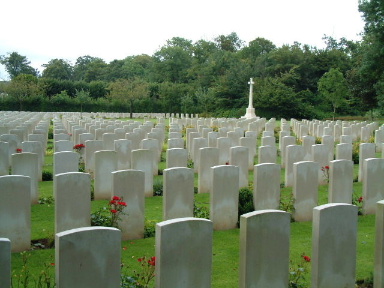SWORD BEACH
6th JUNE 1944

'Sword Beach Cemetery', Hermanville, 2004
HISTORY
In many
ways
Sword
Beach
was the key to success in the
Normandy
landings. It was the nearest beach to Caen
, the capital of the area and the prize that would need to be taken to allow a
breakout. The plan was to land the 3rd Infantry Division
(‘Monty’s Ironsides’), who would then link up with 6th Airborne
Division on the Eastern Flank. The 3rd Division would be assisted in
the landings by Lord Lovat’s 1st Special Service Brigade, which
also included French commandos. Their opposition would be units from the German
716th Division, with 21st Panzer Division located in the
Caen
area – a possible major threat if tanks arrived to block the invasion.
The landings on Sword began
at 7.25am, with the infantry of 3rd Division coming under heavy fire
as they hit the beach. However, many Sherman DD tanks had landed successfully
and were able to lay down fire support. The commandos were doing well, but
encountering stiff resistance as they battled through the streets and bunkers at
Ouistrehem. Units pushed gradually inland and neutralised the defences beyond
the beach at Morris and Hillman bunker complexes. Meanwhile 1st
Special Service Brigade linked up with 6th Airborne at
Pegasus
Bridge
, and by late afternoon infantry and tanks from 3rd Division had also
moved to
Caen
canal.
A counter-attack from 21st
Division comes in the late afternoon, when a Kampfgruppe (Battlegroup)
advances on the Perriers Ridge. Although some units gain sight of the sea, the
attack is driven back with heavy losses in tanks, equipment and men. The Germans
withdraw to the high ground north of
Caen
, and the landings at
Sword
Beach
are now secure. But
Caen
had not been taken – and wouldn’t be for some time to come.
THE BATTLEFIELD TODAY
There has been much
development along Sword Beach, but it is still possible to find traces of the D
Day landings and German defences. The Hermanville
War Cemetery, once called 'Sword Beach Cemetery' contains the graves of many
3rd Division men who fell here. Good museums also abound, such as the Museum
of the Atlantic Wall at Ousitrehem. There are also many memorials to the
units that landed, and inland is the impressive Hillman
Bunker complex.
©PAUL REED 2002-2006













![]()